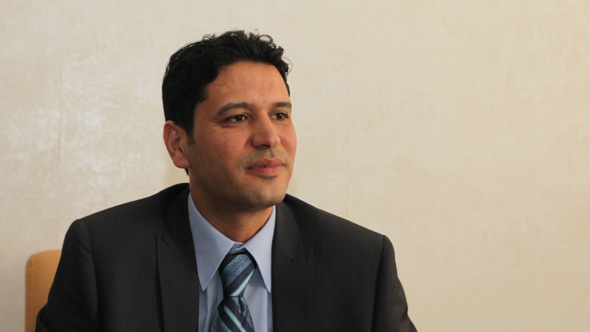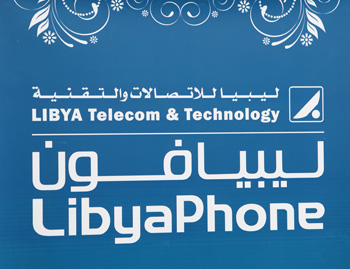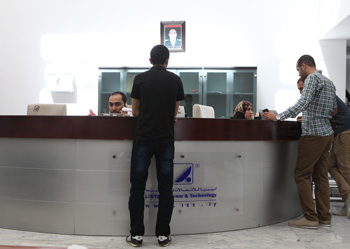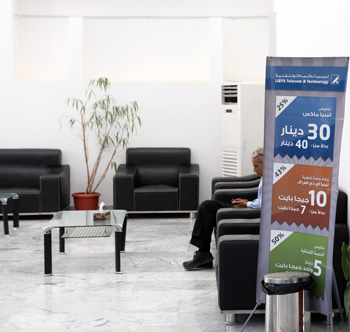LTT Libya: Increasing coverage and improving internet services in Libya
Husam Abulhul, CEO of LTT (Libya Telecom & Technology)
LTT has set up internet services in areas of the country that didn’t use to have them before; the company is increasing bandwidth and providing improved services. LTT is also trying to balance all their services between all the cities as previously everything was based in Tripoli. The company aims to move forward and satisfy the customers’ demands and increase the internet penetration in Libya.
Husam Abulhul, CEO of LTT (Libya Telecom & Technology)

Many people are dissatisfied with the internet services Libya, and are very critical of LTT because it is the only internet provider in Libya. However, I do believe the Minister of Communications said that they are going to license some other companies so that the market may experience some competition. What we still don’t quite have a clear view of is the background of this sector and why it is so difficult to improve the situation. Could you tell us a bit about the history of the internet services in Libya?
The internet service in Libya started in 1997 with the first service provided by Libya Telecom who was the first internet service provider in Libya. The company was founded and owned by one of Gaddafi’s sons and he had the monopoly on the market. It was directed by government policy and was only concerned with serving the needs of the dictator, his family and his regime. This is the background of the company. We faced a lot of problems providing the service to the Libyan people, and they blamed us for serving just one man and not the people. The company was standing by the side of this family and that was a bad thing for the company reputation.
We have changed all of this since the revolution and we are trying to provide internet access to everyone in Libya. We have set up internet services in areas of the country that didn’t use to have them before; we are increasing bandwidth and providing improved services. We are also trying to balance all our services between all the cities as previously everything was based in Tripoli, where we were principally servicing the demands coming from the government. However now we really want to move forward and satisfy our customers’ demands and increase the internet penetration in Libya. We want to play our part in improving this country. We are working towards this goal.
What would you say are the particular challenges that the policies of the Gaddafi regime created for you today?
We are trying to make changes and move towards a new Libya. The demand for internet is too high. Everyone in Libya needs the internet, even the rural areas are asking for the internet. The lack of infrastructure is another challenge we are facing; we need to lay fibre, provide broadband, people want the best technology and internet all the time, so availability is a real concern. We are working very hard to achieve this; our target is to provide these services to the whole of Libya.
What are your plans towards achieving this target?
We have set up internet services in areas of the country that didn’t use to have them before; we are increasing bandwidth and providing improved services. We are also trying to balance all our services between all the cities as previously everything was based in Tripoli… we really want to move forward and satisfy our customers’ demands and increase the internet penetration in Libya.
We are focusing on the mass market; we have two main services here: WiMAX and ADSL. We are expanding these two services over the whole of Libya. We have almost 200,000 subscribers for WiMAX and almost 100,000 subscribers for ADSL. It is my target and the target of the Ministry of Communications to increase the number of internet subscribers in Libya by another 300,000 based on our network capacity. We are close to achieving 400,000 new subscribers, which will increase the internet penetration in the country from 5% to 15% – and this is our target.
What about fibre optics and fibre to home?
This depends on the fibre optics because this is our infrastructure and how we provide better services. We depend on another company that specialises in infrastructure and we have a lot of demand in this regard. It is very hard to work outside of Tripoli in Libya and so we are facing a lot of delays regarding fibre work.
Does LTT offer fibre to home?
Yes, we have a project called FTTH on a campus on the Airport road. We are providing approximately 800 units in a residential area. This project will be launched at the end of this month. There are in fact 2 projects, the FTTH is just on this campus and there is another fibre project related to the infrastructure project. We are facing a lot of problems regarding fibre infrastructure in Libya, however the FTTH service is separate and it is an access service to the customer. 
Would you be able to quantify the amount of investment you are going to need over the next 5 years?
No, not yet. We have a board meeting in two weeks where we will present our budget.
What is your view regarding liberalising the internet market in Libya?
We support it. We are opening the wholesale services to the other ISP and we want to get rid of monopolies in this country so I am in full support of this initiative.
When will the liberalisation happen?
Very soon, the Ministry of Communications has offered 22 new licenses. We are helping this ISP to provide the service by providing them with broadband units. So we will be the wholesale for these ISPs.
In terms of internet prices, will there be an increase or a decrease?
Actually right now the price is acceptable to the customers. The price of ADSL is 20 Libyan dinars per month and the price of WiMAX is 30 Libyan dinars per month, which is acceptable with regard to the Libyan market.
Do you think the criticism that you get from the people is justified?
As I said, this company was established in 1997 and now we are trying to rebrand and reposition this company. We want to move forward and change the image and reputation of LTT. We are trying to satisfy customer demands and increase customer satisfaction by providing better customer service and improved internet coverage and services. We are also trying to implement something called Fair User Policy which is to help customer satisfaction by increasing the monthly quota for the internet and by also decreasing bandwidth once the quota has been used instead of just cutting them off. Also we want to allow users to use the internet at peak times for free. We are trying to look at the customer criticism and solve the issues that they complain about.
What can you tell us about the internal strikes at LTT?
I have handled this issue; the people have returned to work, they have some problems that still need to be solved but everything is back to normal. It has been one month now since the last management went out and they left a lot of problems that I still try to handle. There are no further strikes here at LTT but there are problems to address, some have already been resolved and I am currently working on other issues that need attention.
All in all, our target is working toward transforming LTT into another successful Libyan company.